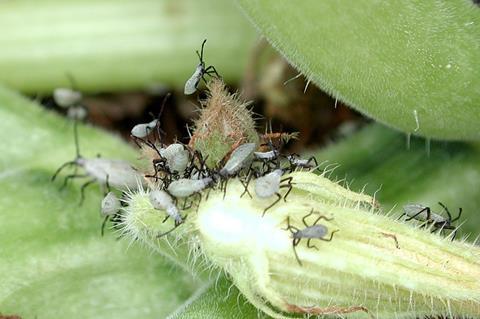Squash bugs, a common and difficult-to-control agricultural pest, need healthy bacteria in their gut to grow and stay alive. However, they do not acquire any bacteria from their parents when they are first born, leaving them vulnerable until their microbiome can be stocked.

Researchers report in the journal Current Biology on June 28 that, to acquire these healthy bacteria, young bugs innately seek out and eat the faeces from older squash bugs.
“This is a directed behaviour. They’re not just feeding on something that has faeces on it because they live in a gross environment. They’re deliberately seeking out the faeces and slurping it up,” says Jason Chen, a graduate student in biology at Emory University and co-first author of the paper. “We show that the squash bug nymphs only feed on faeces from adults of their own species.”
Arena of faeces
To test this, the researchers set up ‘arenas’ to see what squash bug nymphs would gravitate toward if they were given a choice. When presented with the option of faeces or saline, nymphs repeatedly moved toward the faeces from the adults of their species, even in the dark or from a long distance away. After investigating further, the team found that the bugs might be attracted to the faecal smell.
“It’s just as simple a test as you could possibly design, and what made it so great was how clear and shocking the results were,” says Scott Villa, a biology professor at Davidson College and co-first author of the paper. “They just immediately went to the side where there was faecal matter available.”
The researchers filmed this feeding behaviour and noted that, when the bugs found their way to the faeces, they used their mouthparts to drill into the mass and liquified the faeces with their saliva. The bugs then slurped up the faeces with their tongues. This kind of feeding behaviour has not been described in squash bugs before.
Forth in search
While other bugs build their microbiome from faeces in the environment, this usually occurs when the mother leaves her own faeces on top of the eggs she lays, so hatchlings can eat these healthy bacteria as soon as they are born. In contrast, these squash bugs have to seek out these faeces in the environment or die.
“A lot of the other species don’t need this attraction behaviour because it’s on a platter for them as soon as they hatch. Our guys have to work for it,” says Villa. “For something this important, you should automatically pass it on to your kids, but they don’t for some reason. That’s the intriguing part.”
Next, the team plans to focus on why squash bugs expend extra energy acquiring healthy bacteria in this way.
Pest control opportunity
In the meantime, the discovery of squash bugs’ species-specific faecal preference might be helpful in developing pest control against them. Squash bugs feed on the fluids inside of leaves instead of chewing them, making many conventional pesticides ineffective. However, their vulnerability without a microbiome and preference for poop from their own species might be an interesting weakness to exploit.
“These pests are very difficult to control, because they’re not exposed to conventional insecticides,” says Chen. “But if you can target them at this vulnerable stage in the life cycle, that’s a really nice way to target a specific agricultural pest and nothing else in the ecosystem.”







No comments yet